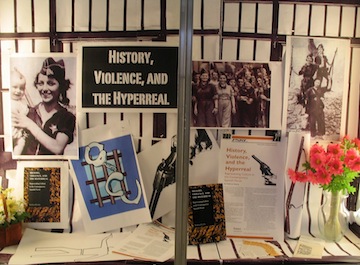History, Violence, and the Hyperreal: Representing Culture in the Contemporary Spanish Novel
Kathryn Everly
What does literature reveal about a country's changing cultural identity? In History, Violence, and the Hyperreal: Representing Culture in the Contemporary Spanish Novel, by Kathryn Everly, this question is applied to the contemporary novel in Spain. In the process, similarities emerge among novels that embrace apparent differences in style, structure, and language.
Contemporary Spanish authors are rethinking the way the novel with its narrative powers can define a specific cultural identity. Recent Spanish novels by Carme Riera, Dulce Chacón, Javier Cercas, Ray Loriga, Lucía Etxebarría, and José Ángel Mañas (published from 1995 to 2008) particularly highlight the tension that exists between historical memory and urban youth culture. The novels discussed in this study reconfigure the individual's relationship to narrative, history, and reality through their varied interpretations of Spanish history with its common threads of national and personal violence.
In these books, culture acts as mediator between the individual and the rapidly changing dynamic of contemporary society.The authors experiment with the novel form to challenge the fundamental concepts of identity when the narrative acknowledges more than one way of reading and understanding history, violence, and reality. In Spain today, questions of historical accuracy in all foundational fictions—such as the Inquisition, the Spanish Civil War, or globalization—collide with the urgency to modernize. The result is a clash between regional and global identities. Seemingly disparate works of historical fiction and Generation X narrative prove similar in the way they deal with history, reality, and the delicate relationship between writer and reader.
"This study is a necessary and invaluable contribution to Spanish literary and cultural studies. It bridges the gap between the study of the historical novel and studies of purportedly 'lesser' popular fiction, and in so doing shatters the hierarchized artificial binary division between high and low culture." Maureen Tobin Stanley, University of Minnesota, Duluth
“The broad-based ideas that are teased out from the study of forms and themes of the works allow Kathryn Everly to avoid generational or chronological categorization and to posit some interrelationships between two quite different sets of writers.” —Alexis Grohmann, Bulletin of Spanish Studies 89.9 (2012): 323-24.
"El estudio de Everly supone una contribución ineludible a la crítica cultural de la novelística española. Tanto estudiantes como crítica especializada encontrarán una nueva manera de pensar la narrativa reciente que apuesta por superar categorías arbitrarias de clasificación tradicional de textos. La autora nos convence de que no sólo las novelas retrospectivas son capaces de cuestionar la historia, sino también las arraigadas en la identidad cultural contemporánea." —Raquel Anido, MLA 128.2 (Mar. 2013 Hispanic issue): 460-63.
"Everly's erudite mixture of theory and textual analysis makes significant connections between historical and Generation X novels that are insightful, unique, and extremely useful for scholars of contemporary Spanish literature." —Timothy P. Reed, Hispania 95.3 (Sept. 2012): 545-47.
For more about this volume, please see Reference and Research Book News, May 2010.
Kathryn Everly, Syracuse University, is the author of Catalan Women Writers and Artists: Feminist Views from a Revisionist Space (2003). She has published articles and chapters in Hispanic Journal, Catalan Review, Monographic Review, Letras Peninsulares, and in various anthologies. Her current research focuses on aspects of surrealism in the works of Mercè Rodoreda.
978-1-55753-558-0
2010. Vol. 49.ca. x, 220 pp. Paper $45.00

Display window in Stanley Coulter Hall, April 2010.
Information last updated September 18, 2015.
For further information about this book, contact the production editor at clawsons@purdue.edu